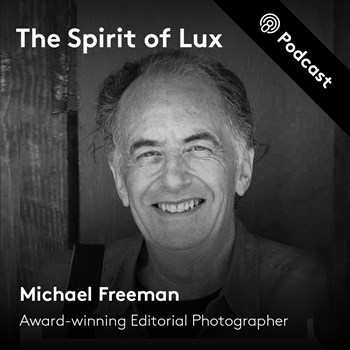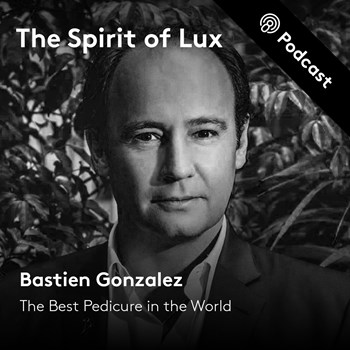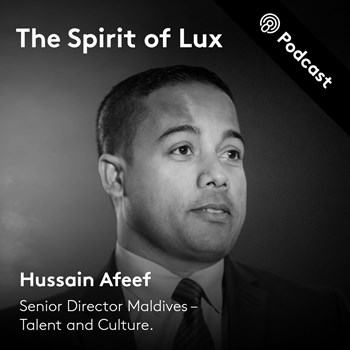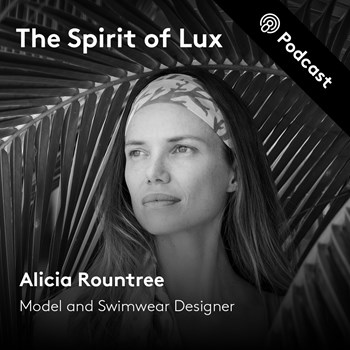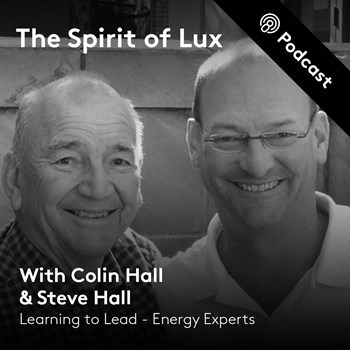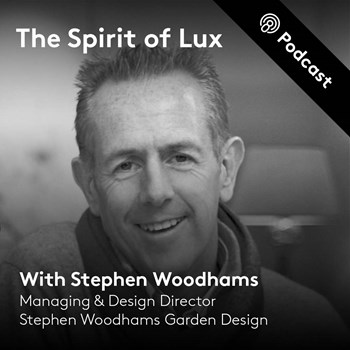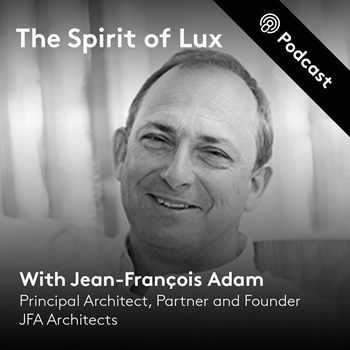 The second episode of our hospitality podcast reunites our host Paul with kindred spirit Kelly Hoppen, a name that no longer needs an introduction in the world of interior design. Her brilliantly executed neutral-toned havens can be found from East to West. In this episode, Kelly takes us through the creative process of our flagship resort, LUX* Grand Baie, and how ultimately, hotel design is about creating a space where guests fall into an experience of relaxation and luxury.
The second episode of our hospitality podcast reunites our host Paul with kindred spirit Kelly Hoppen, a name that no longer needs an introduction in the world of interior design. Her brilliantly executed neutral-toned havens can be found from East to West. In this episode, Kelly takes us through the creative process of our flagship resort, LUX* Grand Baie, and how ultimately, hotel design is about creating a space where guests fall into an experience of relaxation and luxury.
Designing perfection with Kelly Hoppen
Paul Jones: I am Paul Jones and you’re listening to The Spirit of Lux
Kelly Hoppen: For me, creating a space for people to come in, you've got to recreate these wonderful moments and experiences. And that is the smell, the taste, the sight, the touch, all of those things rolled into one.
Kelly Hoppen: I remember having that conversation and saying, "Look, the world is getting smaller. The international clientele that again, to come to Mauritius, we have to create something that is such a luxury, that it is off the charts, but it doesn't lose the essence of what Mauritius is about
Kelly Hoppen: It was more about feeling that that was your home for a week or 10 days or two weeks rather than being in a hotel room. That was what I tried to achieve in this hotel, that it doesn't feel like a hotel, it just feels like your extended home.
Paul Jones: Welcome to the second episode of The Spirit of Lux. Today I'm joined by Kelly Hoppen, an award winning interior designer who’s changed the face of the design industry with her East meets West style. Kelly is one of the most sort after interior designers of her generation. Her ability to re-create her clients vision into a space that feels like one zone, a space that is reflective of the spirit, life and loves of the people who reside in this space, is the reason why so many celebrities flock to seek about Kelly’s expertise for the past four decades. There’s a lot to cover in this episode. We’ll dive into LUX* Grand Baie’s design journey with Kelly, located on one of the finest beaches in the north of Mauritius. This resort will redefine sophisticated luxury. We will discuss Kelly’s inspiration using lights, smell, location and foliage to create an urban, tropical atmosphere. With thousands of projects over the last four decades, Kelly and her talented team create multi-faceted couture and interiors advising on every aspect and detail of the project. Her diverse portfolio of projects includes exclusive commercial properties, private homes, turnkey properties, yachts, private jets, 5 star hotels and cruise ships. Kelly good morning and welcome to The Spirit of Lux Podcast. We are so delighted to be with you this morning. And it must be at least 20 years that we've known each other, if not more. Now, Kelly, you are unique in the world of interior design, as you created a signature look, which you christened East meets West. Please let our listeners know what is East meets West.
Kelly Hoppen: Hi Paul. Yeah, 20 years. Is it really that long? Feels like yesterday on the beach in Mauritius. So East meets West was a really interesting creation because I was brought up in much more traditional homes. My grandparents’ home in Constantia was very traditional. My mother's home was modern, but traditional. But I loved interiors always loved them. And I started to become fascinated by the East because they found an old trunk down Portobello Road when I was very young. So I started looking at all the things from the east. And in those days, you didn't have Google or Instagram. So it was going to libraries and finding things. And for me, it was about sort of looking at the world globally, and seeing how I could fuse these two incredible types of worlds and design into one. And so East meets West kind of came about through trial and error and actually finding what I felt comfortable in, but always having the essence of the East because I started to travel there and felt something extraordinary, but also came from the western, love that, and sort of put the two together. And that's where it actually was born. And it's taken on many different sorts of combinations as I've grown over 44 years, but the essence of how it feels to balance those two worlds gives me a lot of peace. I just love it.
Paul Jones: Wonderful. And Kelly, I'm so happy you mentioned your mom, because you come from a very artistic family. I remember buying wonderful art from your mother. And even more, shall we say expensive art from your famous brother who represents so many illustrious world-famous photographers. How does this all come about in your family? Is that from your mom side, your dad, or?
Kelly Hoppen: I think you, being South African, like I am, know that family is kind of everything. And I was brought up not sort of as a child who only saw people of my own age. My parents and grandparents used to involve us. So we met so many interesting people, whether they were poets or artists, or people in food or travel or dance or all these different cultures. So I think I was brought up in an environment that was truly amazing, and really diverse. And my mother got into sort of antiquarian books and then into art. My brother got into photography; my father was in fashion. So I think it wasn't one person. It was a kind of combination of everything.
Paul Jones: And Kelly, you do more than interior designer. I know that you've helped so many young people around the world make a better life for themselves. You've also done a lot of charity work. I know you're you don't like to talk a lot about this, but if you could give us a glimpse into that side of Kelly Hoppen, please.
Kelly Hoppen: Yeah, I mean, I've worked with charities that really mean something to me, the Prince's Trust is one example where they've helped now a million young people have a better life. And I got involved in that a long time ago. And the Diana Awards, anti-bullying, and cancer charities. And so, working with charities and working with a great campaign to sort of help and mentor young people, I suppose, the older you get the wiser you become. I built a wonderful career for myself, and I wanted to sort of give back, but it wasn't that kind of cliché wanting to give back. I genuinely love young people. And I just feel that we're living in a world where if you're on Instagram, you have a voice and you can really help people and talk to people and guide them and give them some positivity. And certainly in the last 15 months, I made it a real point every day to do that. And when people sort of write back to you and say, "You got me through the lockdown. You got me through the pandemic," it was only a few minutes of my time every day but it was genuine and it was authentic. And I love doing that side of it. I don't do it for any other reason, but that I actually enjoy it and love to see how people can flourish. Because let's face it, you've got kids, I've got kids, I've got grandkids now, and our children are our future. So we need to help them and give them as much wisdom as we can on the way.
Paul Jones: About 11 years ago, Kelly, I reached out to you from Mauritius. I said, "Kelly, I need help. We have these rundown hotels, they're in gorgeous locations, but we have no money and we can't close the hotel. But we might be able to scramble some money together in a small budget. Can you help?" Do you remember that and what was your reaction? And then what did you do about LUX* Belle Mare?
Kelly Hoppen: Well, first of all, you were extremely clever, because I was actually lying on a beach in Mauritius when you asked me that. So I was already completely sort of intoxicated with the island. And you know me, I'm a typical Leo, I love a challenge. And it's not ideal when you don't have the money to sort of put the vision together. But as you say, the LUX* Belle Mare was an extraordinary and is an extraordinary location. You had an incredible workforce of people who were right behind me all the way. And we managed to do it. We sort of created a brand for you, working with you, that was barefoot luxury, that was very different to anything that had happened in Mauritius. And we pulled it off. And it was hard work. But the rewards were fantastic. And, you know, I would still go back there year after year, and the same staff would be there. And they would still thank me for what we had done there to change it because that was their home, they were proud of the environment. And it was such a big shift. But it was small things we did by painting everything in sort of beautiful, pale colors and adding splashes of color and trying to sort of recreate the bedrooms in a way that weren't old. And of course, you had one of the best beaches in Mauritius-- the white sand and blue seas. It was a tough one, but we did it. And I think it was sort of birth of the LUX* brand in Mauritius.
Paul Jones: Yes, and of course, Kelly, on that white sand beach, you helped us create our sub brand in the form of the beach club, which was called ... I can't remember.
Kelly Hoppen: Beach Rouge.
Paul Jones: Ah, yes! [laughter]
Kelly Hoppen: The famous Beach Rouge, which was a combination of your travel, my travel, and dreams. And we created something really very special. And again, the team at LUX* are extraordinary. They were excited. They were used to me being there moving things around, I'll never forget once walking in, someone was waiting to be seated and I walked over and move two big pots and they looked at me like I was mad, "What is this guest doing moving parts?" And one of the people taking them to their seats said, "Kelly Hoppen designed this." They weren't, "Oh, okay." We created something extraordinary. And I'm sure as we keep talking, we'll talk about the new Beach Rouge now. But it was having an international South of France kind of feel in a in Mauritius for the first time.
Paul Jones: Right. And then we did something equally, if not crazier, if you remember we said, "Kelly, we don't want the reception anymore. We want to transform it into a coffee bar." You said, "A coffee bar? You're crazy. What's that?"
Kelly Hoppen: Yeah. Listen. Working with you is extraordinary because you never know what's going to ... Work emails are going to come through in the morning from you from wherever you are in the world seeing an idea, but I love that because I'm the same. And actually, we were given that entrance space, we couldn't change it. And actually, it was a really clever thing to do because it was a moveable area where people can mix and stop off, "I would go to the gym, I would get my shot of coffee." People would come in for the long-haul flight, they would sit in those wonderful seats, they could have a coffee, they could have water, whatever it is. So you kind of created this new environment which actually on a place like Mauritius, it's quite nice that it's less structured. You're not walking into Claridge in London where you go to a reception or concierge, this is much more relaxed. So in a way, by having this coffee bar, as your reception area, sort of immediately made you drop your shoulders and go, "I'm not in a city anymore. I literally am on the beach." And this is a new way to do to arrive in a hotel. So it was actually really clever, Paul.
Paul Jones: Yes, and then roasting our own coffee behind the coffee bar was also a point of interest. I think it was one of the first hotels that roasted coffee. So it was really a tremendous achievement.
Kelly Hoppen: Yeah, but it's sort of one of the things that you and Patrick have taught me. For me, I'd always said, "The inside-outside have to be one." But you took it one step further and said, "The backbones of a hotel (i.e. the roasting of the coffee or watching them cook while you're sitting in a restaurant behind a screen) it was like introducing the bones of a business and how the food, the drinks, everything else. Everything sort of became one and it was really interesting to be involved in that design process."
Paul Jones: Well, there's no question Kelly, that LUX* Belle Mare became a springboard for, as you say, the creating the brand, and moving onwards and upwards. And then we found that a little bit more money, but this time, a lot more, and we then move to another place, which was LUX* Grand Gaube. So tell us how did you manage to take on that mission and make it different to what you did at Belle Mare.
Kelly Hoppen: I remember the first time we walked around, you said, "I'm not feeling it." And I started walking around and totally feeling it because I didn't have the baggage maybe that you had, because I was coming from London and I was there again on a beautiful beach. And so I was just looking at the kind of the whole thing as one. And immediately, I just sort of got lost in the space and sort of took the brand one step further. Obviously, we had more finance. So it was a real joy to be able to actually be more creative. But we created something very special but it was very different to Belle Mare, and it was really important for me to keep the brand identity but just shift it so that people could possibly go and stay in both hotels and have a different experience. But again, the open spaces as you walk in that wonderful wall of beautiful Busquets made in South Africa, to the Cafe LUX* going into the beautiful restaurants. Everything was an experience. So, for me design is about walking through these experiences. If I go back to my grandmother's home, the style was so not me. But the way I felt in it, the smelling of the coffee and the cedar chest sitting and crocheting with her to go into picking the hydrangeas and laying the tables. All of that was what home was about for me when I went back to South Africa. For me, creating a space for people to come in, you've got to recreate these wonderful moments and experiences. And that is the smell, the taste, the sight, the touch, all of those things rolled into one. So, when you design a hotel like this, you can't sort of focus on one thing for me. I kind of get immersed in the whole feeling of this face as if I'm the first person to walk in there and what is it I feel. Is each feeling okay or do I need to change it? And I think Grand Gaube is very special. It's wonderful with children as well. And it's a very different outlook to what Belle Mare is. So, you have two very different types of hotels but the same brand.
Paul Jones: Yeah. And certainly, Kelly, you did an incredible job with Grand Gaube. It truly is quite a remarkable hotel and it keeps growing and growing, and couldn't be more different, as you say than Belle Mare but what's still the same ethos, still the focus on the-- as you put it all the team members who are just dying to share the best of Mauritius and the cuisine and the bars and so many experiences, which we have in in that property. So then we moved. We fast forward to I think it was about three years ago, we'd finished Grand Gaube and then we had this three-star hotel, which was one of the early hotels that was built in Mauritius, The Merville, on the most incredible site in Grand Baie, which is really just a phenomenal place, because it's right in the northern tip of the island, where everything is sort of congregate. And it really is an incredible site that we had there. But the hotel was obviously over 50 years old and had done its time. So I remember when we first started talking about it, we were saying, "Well, we can do a makeup job on the existing rooms. We can obviously refurbish the public areas." And then finally, finally, we came to the conclusion, "You know what? The site is worth far more than any of the bones of this hotel that is there." And sometimes you have to make that decision, as tough as it is, to knock it all down and start again. So when, Kelly, you were given that as a blank canvas, what were your first thoughts? How did you then approach this new breed? Because now, we had quite a large budget, and it was going to be our first Greenfield LUX* Hotel.
Kelly Hoppen: Yeah, I mean, the excitement was amazing when you told me and I just kept thinking it was going to be taken away every day. But it was just such a great feeling to be able to really now design something completely new. And it was interesting because both you and I were on the same page from day one, because I remember having that conversation and saying, "Look, the world is getting smaller. The international clientele that again, to come to Mauritius, we have to create something that is such a luxury, that it is off the charts, but it doesn't lose the essence of what Mauritius is about because I think far too often, you try and create something that is so luxurious, but then you lose that wonderful feeling of sort of fairness that you have in Mauritius." And so I suppose, immediately I had loads of ideas and we were throwing them about and everyone sort of loved them. And the results for me is just the perfect balance between that barefoot luxury and elegance and the highest quality. But again, the experiences, if we take Beach Rouge, I mean, that is off the charts now. It's this massive space, there's sort of 7,8,10 different experiences, places that you can be. The restaurants, Ai Kisu is just like the dream restaurant that could be opened anywhere in the world, not just Mauritius. It's a brand in itself. And the villas, the bedrooms, everything, again, has been designed with the same thought process, which is what is the end users experience? And what is it that's going to make them want to come back? What is it that just makes it the favorite hotel of all-time? And again, working with the teams and obviously in a very challenging time is extraordinary, that it is going to open up this year. And I think that people are going to really not want to leave once they get there. I know I would. But it's got a lot of amazing things about it. It's very green, it's very eco. We've thought about all of that with the help of your team and with the architects. And let's just talk about the architecture. I mean, that in itself, the architecture, the interiors, the food, everything fused into one is just going to be an absolute feast forever, whoever goes there.
Paul Jones: And Kelly, you mentioned the team and throughout from Belle Mare to Grand Gaube, to now Grand Baie, there was this team that congregated around yourself. I'm thinking of Rob, Steven, Patrick, and Keith. Tell us about this team and how it all gels together and who are the different characters?
Kelly Hoppen: Yeah, I mean, Rob is been a lighting engineer and friend of mine for years. Lucy and Leah, my whole team, and Adam, we worked together before. And Steven, you had worked with but I had also worked with. So, it was kind of like one of those things where we sat down, I remember, "This is the team. Let's bring in people that we all like, that we all enjoy being with." Because it didn't feel like a job, it felt like a group of people with a dream and trying to create that dream. And I think the only way that you can create really beautiful interiors, is when you have a team that are all on the same page. They say, if a chef doesn't cook with good intention, it gives you indigestion. We had a team of designers from all walks, who all wanted the same thing. And because we've kind of worked together on the other projects, we now had this blank canvas to be able to create whatever we wanted. And I think the excitement of that was just beyond. And once we started to actually put pen to paper and create these designs, people became more and more and more excited by it. And I don't think that excitement has wavered in the slightest, actually, because I watched my team on it, and they want it all to be perfect. And it drives everyone mad, I know. But at the end of the day, we want to open it and it to be exactly what we all wanted.
Paul Jones: And Kelly, I would describe you as a fitness freak. I'm also a fitness freak, but you're off the charts. How does that obsession, if I may call it obsession, with what you eat or how you exercise, how does that then influence your design when it comes to the whole area of the often use word of wellness?
Kelly Hoppen: Yeah, I mean, wellness is really important in be my life always and it makes me feel better. I think clearer and a bit of a control freak. So, it makes me on top form. But when creating the wellness area, it was like taking every experience I've ever had and creating ones that have never been created before. And for me, that's one of the easiest areas to create, because a lot of spars are very formatted today. And I think my personal view is that a lot of hotels have spas, the usual smell, the usual bowls with water, and the floating flowers, and all of that. I mean, that's kind of, for me, so old-fashioned. And so, to create a wellness spa that has a different kind of feeling, that is almost totally neutral. Because not each person is going to come in feeling the same, but they all have the same intention, which is they want to be looked after. So, with my travel and your travel, we've seen a lot of things. The only way I can describe it is it's earthy. That feeling when you take your shoes off and you walk on sand or you walk on grass, you feel the Earth. That space is Earth, and it will sort of take you to whatever level you want to be in with obviously the best beauticians and people that you've been taken on board to work in this space.
Paul Jones: And you've put it on four levels, including the rooftop level where you've got these 600 square meters of outdoor wellness space. This must be an incredible attraction for people knowing that they have this reserved space outdoor for themselves. And how did you go about that?
Kelly Hoppen: Well, I think the one great thing about this hotel is that we had the space to be able to do things that hadn't been done before in Mauritius. And I think to have a pool area and bar up the top where there are no children and to be able to do fitness and wellness up there just takes it to another level. And I know that I would go up there, I would definitely use that space, and have a great workout in the morning and then just collapse on those beds and be in that pool and look up to that beautiful sea and have a drink or go up there in the evening and do your workout and then have cocktails. It just creates a very different kind of almost Miami type environment, which is different when you go down to the ground floor level. So again, it's giving people the choice. And I think today it's not just about giving people a choice with food and giving them several restaurants; you've also got to give people choice of wellness and fitness. And I think you've done that with what we've done in the space.
Paul Jones: And Kelly, take us inside the Junior Suite of LUX* Grand Baie. When you approach the entrance and then walk us through what was in your mind as you design the different spaces and the different elements of that gorgeous Junior Suite.
Kelly Hoppen: Yeah. [inaudible] became quite a big thing and I know you all kind of heard it a million times when I was first talking about it, but I wanted to create a suite that sort of felt like an apartment. And so I wanted to, again, use only neutrals for the space, but to have loads of different textures. So whether it was from the stones that we use to the wood to the art to the ceramics to the joinery to the curtain fabrics, the bed, I mean, people listening, the detail that you go to in terms of you know how comfortable the bed is, and how the bedding is tucked in and making it look like it's puffy rather than flat. And me with the fillers and the cushions or Lucy changing something on the on a chair, it's remarkable how many minds are put together to create the perfect suite or bedroom. But it was more about feeling that that was your home for a week or 10 days or two weeks rather than being in a hotel room. That was what I tried to achieve in this hotel, that it doesn't feel like a hotel, it just feels like your extended home.
Paul Jones: And Kelly, how did you get so much work in China as we did? We've got a lot of work going on in China. But I think you've got many times more than we have. How did all that happen?
Kelly Hoppen: Well, I started working in China like 25 years ago, and I sort of made it my ... I'd heard that if you meet people and talk to them in person in China, you had a much better luck of actually working. And I just started to meet all of the chairmen. Once I'd met one, I met another, and I just kept going there, because I loved being there. I loved the feeling that I had in the east. And I started to build up relationships and put all of the chairmen on speed dial and started to create these extraordinary developments and homes that were very groundbreaking in China at the time, and have built up such a massive business that we have a lot of stuff in China now. And a phenomenal amount of work, we turn work down every single week. I missed terribly going there, I have to say, it makes you realize how much you know, for me anyway, the east is such an important part of my being. But I love the fact that they love what we do and they appreciate what we do. And they pretty much give me a free hand to create these extraordinary environments, which are sold before they're even built. So, we've shown that we can do what we need to do. And I love the scale of everything in China. It's just so vast. You're building cities and everything. It's just incredible.
Paul Jones: And Kelly, you've done something quite remarkable. You've done apartments, you've done villas, you've done hotels, but then you moved on to what I never expected you would. And that was cruise ships.
Kelly Hoppen: Yeah. So they called me up and they said, Kelly, we'd like to give you a cruise ship to design. And I said, "Look, it's not my thing. I'm not into cruises." They said, "No, no, no. We want to give you a free hand. We want you to change the face of the cruise industry." Well, anyone knows me, I love a challenge. And we did. I mean, Celebrity we're one of the most extraordinary companies I've ever worked for. I'm still great friends with them. They're building beyond, which is the third large one that we have designed. And it was such an incredible experience. And people often said to me, but I mean the sheer scale, I said, but I don't look at the scale. I just look at what I have to design. But when I physically went on the ship for the inaugural launch, I was blown away. And yeah, it changed the face of the cruise industry. So, it was a real feather in our cap. And I'm really glad I did it because it taught me a huge amount about space and weight, and just how you can design things in a different way. So, yeah, it was amazing.
Paul Jones: And Kelly, coming back to LUX* Grand Baie, we have this Skywalk connecting the hotel to this wonderful collection of residences. And those residences are quite unique. And anybody who's been inside the model residence that you designed is just absolutely, as you say, been blown away. How do you see the future of residences in connection with the luxury hotel?
Kelly Hoppen: The thing is that it was quite a difficult one. It was a challenge to try and sort of link the two together but actually it works really well. And again, it's just another feather in the cap of this incredible hotel that you have something that's different. And I think one of the things that's quite nice is that everything is quite spaced apart, but that you have this amazing walkway that you can walk through to connect you to the hotel. And I think it works really well. And obviously, the interiors are beautiful. And it's a different type of space. So, people that are going to stay there, stay there, because that's what they want, rather than being in the hotel. But I think it works really well.
Paul Jones: And perfect for families, of course.
Kelly Hoppen: And so perfect for families as well.
Paul Jones: Two separate bedrooms and lots of living room space, a kitchen, balcony. Wonderful, wonderful. And right at the end, we have these magnificent villas, which are just incredible. So, through the eyes of you, Kelly, how do you see those villas?
Kelly Hoppen: Who doesn't love a villa? I think it's an extension of what we've done in the rest of the hotel. But obviously, the space and wonderful staircase, for example, that I call the sort of whipped cream staircase, to the beautiful kitchens, the furniture, the details, the outside space, the pool, all the areas that we've created. Again, when creating those spaces, Lucy and I would sit down with Leah, and we would really think,
Kelly Hoppen: What would we want? What would people want? What was the experience? What was the texture? What was the softness of the sofa or the hardness of the chair? Or do you want to have a radio that you can put on as well as having music throughout, making your cup of coffee." Every single detail, working with the architects and the landscape, and how you would manage to run that the villa itself, all of those things all together. But it just kind of fell into place. And again, it was all of the accessories. There's nothing shiny. I used a lot of clay, I used a lot of interesting stones and wood textures and fabrics and the photography done by a photographer in Mauritius, all of these elements. It wasn't about just sticking a picture of a shell up on the wall. It was like what works in this space. So, they're very individual and the architecture of them is stunning. And I think people are just going to not want to leave.
Paul Jones: And Kelly, we are opening this hotel in three months’ time. Are you nervous?
Kelly Hoppen: My AirPods just fallen out. I'm not nervous at all about it opening. It's just obviously we're living in very sort of crazy times. I'm just hoping that we can open but we're ready. We're ready to open and I'm excited. I'm excited more than nervous to be honest.
Paul Jones: Kelly Hoppen, thank you so much for being our guest on this wonderful podcast. We're so grateful. And we're looking forward to getting together. I'm in Singapore, you're in London. We have to meet in Mauritius in November.
Kelly Hoppen: We definitely do.
Paul Jones: Looking forward to it.
Kelly Hoppen: Thank you, Paul. Lots of love.
Paul Jones: Thank you.
Kelly Hoppen: Bye.
Paul Jones: Thank you. Bye-bye.
Paul Jones: Thank you for listening to The Spirit of Lux with me Paul Jones. If you like what you heard don’t forget to subscribe to our channel on Apple podcast, Spotify or wherever you listen.



